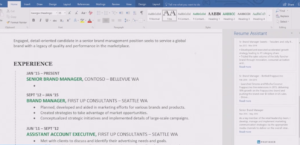I’m usually a big fan of Fast Company articles (in fact my friend Lars Schmidt is now a regular contributor to FC and his stuff is awesome!)but this one seemed like the biggest contrived piece of new-aged garbage, I just had to share!
The article has a great premise: These Are The New Rules of Work. You know, one of those articles that will show us all how we use to do work and how we now do work. Well, maybe, but also how we hope we could do work like they talk about in magazines like Fast Company, but we really don’t because we live in the real world.
Here’s a taste:
Old Rule: You commute into an office every day.
NEW RULE: WORK CAN HAPPEN WHEREVER YOU ARE, ANYWHERE IN THE WORLD.
Cute, but I actually work at a job where we go to the office each day, like most people in the world. So, while it would great to work in the Cayman Islands, my job is in Flint, and if I don’t come in, I don’t get paid. Which makes trips to the Cayman more difficult.
You get the idea. It was written by a professional writer, not by someone who actually works a real job. Writing isn’t a real, normal job. When you write freelance, you can actually work from anywhere, because you basically work for yourself!
Here are the others:
Old Rule: Work is “9-to-5”
NEW RULE: YOU’RE ON CALL 24-7.
Well, you’re not really on call 24-7, you choose to be ‘connected’ 24-7, there’s a difference. I do believe that ‘leaving’ your job at the office was a concept that was overblown for the most part in our parent’s generation. They claimed to do this, but only because they didn’t have email and smartphones and laptops. Let’s face it, our parents would have been just as connected given the same technology.
Old Rule: You have a full-time job with benefits.
NEW RULE: YOU GO FROM GIG TO GIG, PROJECT TO PROJECT.
There’s no doubt there is a rise in the use of the contingent workforce, but this doesn’t mean it’s necessarily chosen by the worker. True, thoughts have shifted that many people no longer want to work at one company for forty years, but much of that has been shaped by companies and economics. When you live through an entire decade of layoffs and downsizing, you begin to think of the work environment as more transient. The crazy part about this mindset is organizations still feel like candidates should want to stay at a company for forty years, even though they can’t, and won’t, guarantee that for you.
Old Rule: Work-life balance is about two distinct, separate spheres.
NEW RULE: FOR BETTER OR WORSE THE LINE BETWEEN WORK AND LIFE IS ALMOST ENTIRELY DISAPPEARING.
This is the one rule I actually agree with. Again, from a day when you could actually separate yourself from your work and personal life. In today’s ultra-connected world, it becomes very difficult to do this. I think most people get tired of living two separate lives, and just want to live one. This is who I am, professionally and personally, take me a whole person, or not.
Old Rule: You work for money, to support yourself and your family.
NEW RULE: YOU WORK BECAUSE YOU’RE “PASSIONATE” ABOUT A “MOVEMENT” OR A “CAUSE”—YOU HAVE TO “LOVE WHAT YOU DO.”
This is actually the single worst piece of advice ever given to mankind! Bar none. If this was actually the case, how do you think anything would actually get done on this planet? How would store shelves get stocked? Gas stations get to run. Your dinner gets cooked and the dishes washed at your favorite restaurant? Do you really feel there are folks “passionate” about washing dishes for you? That they want to wash dishes for your cause of having a chicken fried steak and gravy for dinner?
Get some freaking perspective.
I think it’s great if you can work at somewhere you’re passionate about, good for you. But it’s definitely not necessary for you to have a great life. Have a cause that is special in your life? Perfect, go for it. You know what really helps most causes? Money! If you have a job that makes great money, just imagine how you can truly help that cause.
So, what do you think about these ‘new’ rules of work?


